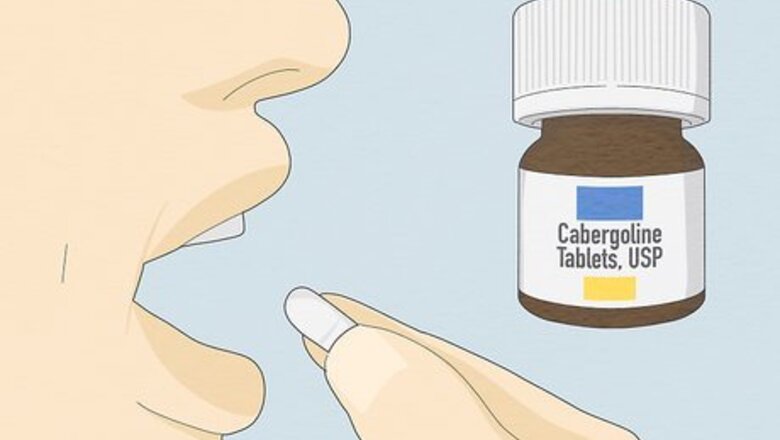
views
X
Trustworthy Source
National Institute of Diabetes and Digestive and Kidney Diseases
Health information from the National Institute of Diabetes and Digestive and Kidney Diseases, a division of the U.S. National Institutes of Health
Go to source
If you’ve noticed you have a lower sex drive lately, your breasts feel bigger or more sensitive, or you’ve noticed strange skin or vision issues, you may have excessively high prolactin. Only a few things can trigger this, and most of the time the root cause is a side effect from medication, a benign tumor on your pituitary gland (called a prolactinoma), or hypothyroidism. While these conditions are rarely dangerous, it is important to talk to your doctor and get a blood test to confirm the issue so that the two of you can work out a treatment plan.[2]
X
Expert Source
Damaris Vega, MDBoard Certified Endocrinologist
Expert Interview. 11 November 2020.
Read on to learn everything you’d need to know about lowering your prolactin levels.
- Treatment for elevated prolactin is typically medication (cabergoline). In rare cases, you may need minor surgery or radiation treatment.
- While prolactin is responsible for the production of breast milk, both men and women can experience elevated levels of prolactin.
- Your doctor will measure your prolactin levels via a blood test. You cannot measure prolactin at home, so visit your doctor soon.
Prolactinoma Treatment
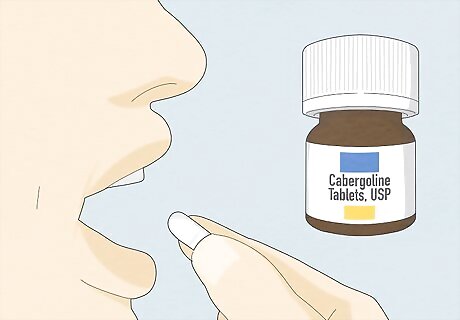
Take the medication cabergoline to treat your tumor. This medication is the first one that doctors will go to, as it has the fewest side effects and you only need to take it twice a week. It will most likely shrink the benign tumor and bring your prolactin levels down over time. Roughly 75% of patients respond to medication, so you’ve got good odds here. This medication can cause nausea and dizziness, although most patients report no side effects. The other typical medication is bromocriptine, which is more prone to make you nauseous. With this medication, your doctor will likely have you increase your dose gradually to lessen the side effects. Doctors typically only prescribe this if cabergoline proves ineffective. You may need to take these medications indefinitely, though once the tumor has shrunk and your prolactin levels decrease, you may be able to come off the medication.
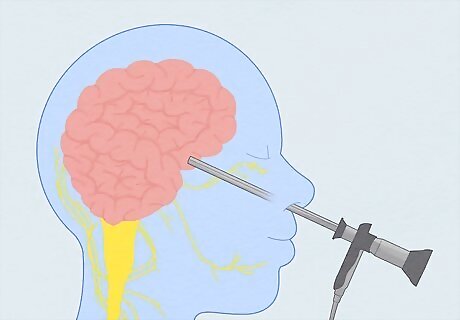
Ask about surgery if medications are not working for you. If medication proves ineffective, you may require surgery to remove the prolactinoma. A surgeon will go in and remove the tumor so that it can't cause issues like increased prolactin levels. The surgery to remove pituitary tumors is an endoscopic surgery, meaning that the surgeon will go in with a camera through your nose to reach the gland and remove the tumor without cutting your skin. If you have another type of pituitary gland tumor instead of a prolactinoma, this may be your doctor's first choice of treatment.
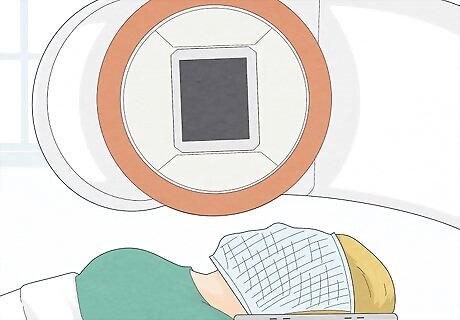
Discuss whether radiation is preferable to surgery with your doctor. Radiation used to be a common treatment for this type of tumor. However, it's less common today since medication and surgery are so low-risk. Talk to your doctor about whether radiation may be preferable to surgery. In some cases, radiation may be the only option if you don't respond to the medication and your tumor can't be operated on safely. Sometimes, you may only need one treatment, while other tumors may take more treatments. It depends on the size and type of your tumor. The most common side effect is hypopituitarism, where your pituitary gland doesn't produce enough hormones. Very rare side effects can include damage to nearby brain tissue, including lesions or nerve damage.
Prescription Medication Adjustment
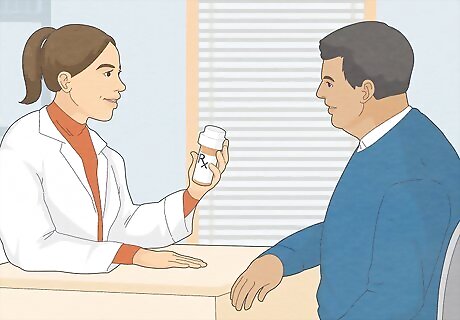
Talk to your doctor about your current medication regimen. Some prescription medications can increase prolactin levels as a side effect. Once your blood test confirms your prolactin levels, walk through your current meds with your doctor to discuss potential complications. The following medications can raise prolactin: Antipsychotics (perphenazine, haloperidol, sulpiride, sertindole, risperidone, and more) Anti-emetics (metoclopramide and domperidone) SSRIs (citalopram, fluoxetine, fluvoxamine, paroxetine, and sertraline) Select cardiovascular drugs (verapamil, reserpine, and methyldopa) Tricyclic antidepressants (verapamil, reserpine, and methyldopa) Opiates (methadone and morphine) Oestrogens (any high-dose oral contraceptive)
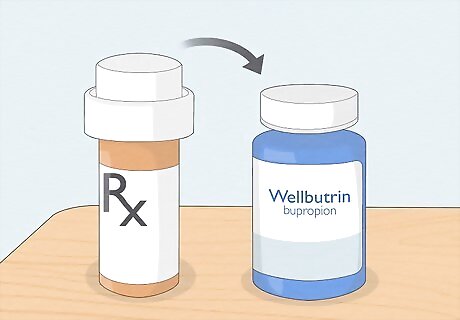
Ask your doctor about stopping the medication or switching it out. If you’re on a medication that’s causing your prolactin levels to increase, talk to your doctor to discuss alternatives. There may be a different treatment for the same condition that won’t throw your prolactin levels off. Once you switch meds, your prolactin levels should stabilize on their own. Do not go off of a medication without your doctor’s approval. For example, if you take sertraline (Zoloft) for obsessive compulsive disorder, you might ask your doctor about switching to bupropion (Wellbutrin).
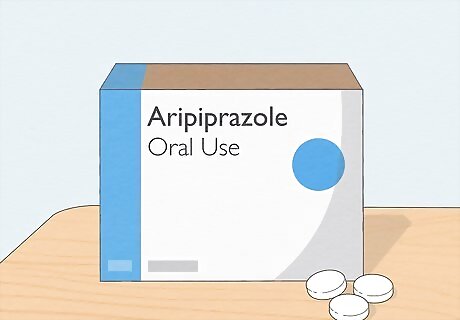
Discuss aripiprazole as a supplement or replacement for your antipsychotic. Antipsychotics specifically tend to be a big trigger for high prolactin levels. Aripiprazole (Abilify) has been shown to reduce prolactin levels when taken instead of (or in addition to) traditional antipsychotics. Ask your doctor if taking this medication is a possibility for you. This medication can cause side effects like dizziness, nervousness, headaches, stomach issues, weight gain, and pain in your joints. It can also make you feel unsteady on your feet.
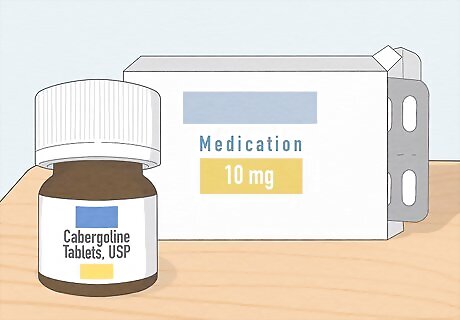
Ask your doctor about taking cabergoline along with your regular meds. While cabergoline is the main medication used to break up and treat pituitary tumors, it’s also used to treat general hyperprolactinemia (any form of high prolactin levels). If your meds are working and you don’t want to switch them out, ask your doctor about adding cabergoline to your medications. You may not be able to take cabergoline if there is a chance that it interacts with other meds you’re taking.
Natural Home Remedies
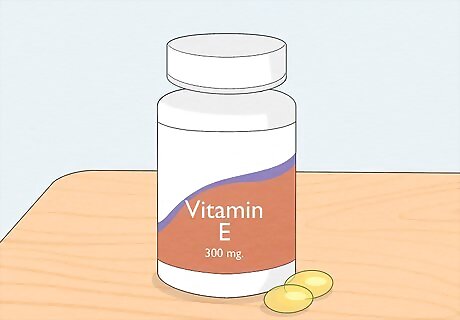
Add 300 milligrams of vitamin E to your daily supplements. Increasing your vitamin E intake can lower your prolactin levels if they’re elevated. Talk to your doctor to confirm that you’re able to take vitamin E supplements and then add it to your daily medication. It’s especially important to talk to your doctor first if you have any kind of kidney condition, which may struggle to filter the vitamin E. Side effects are rare with vitamin E. However, if you overdose, you may experience stomach issues, tiredness, weakness, rash, headaches, blurred vision, increased creatine in the urine, and gonadal (testicles) dysfunction.
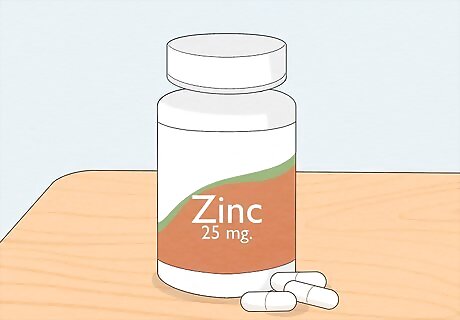
Increase your zinc intake with a 25-40 milligram supplement. A zinc supplement may also help lower your prolactin levels. Try starting with 25 milligrams per day and increasing as needed to 40 milligrams per day. Have your prolactin levels rechecked to see if you need to increase the dose. Ask your doctor about proper dosing for supplements like zinc. Side effects of zinc can include headaches, indigestion, nausea, diarrhea, and vomiting. If you take more than 40 milligrams per day for a long time, it can cause copper deficiency. Also, avoid taking the intranasal variety (through your nose), as it can cause you to lose your sense of smell.

Try taking a vitex (chasteberry) supplement if you have menstrual pain. Many people who menstruate experience high levels of prolactin during their regular menstrual cycle. If this time of the month is painful for you, talk to your doctor about taking 20 mg daily the week of your period. This will suppress excess prolactin production and keep you comfortable while you menstruate. If you don’t like taking pills, you can buy vitex extract and add 40 drops to a cup of water every day. It’s generally not recommended to take vitex if you’re also on a dopamine agonist (like cabergoline).

Get 7-8 hours of high-quality sleep. Not getting enough sleep can throw your system off balance, including the production of hormones like prolactin. Go to bed at a reasonable time so you get a full night’s rest. Sleep alone will help decrease your prolactin levels. This is an especially common problem for people with sleep apnea. If you wake up randomly, wake up with headaches, or snore, ask your doctor for a sleep study referral.
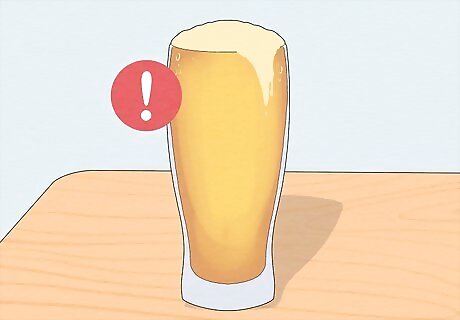
Try cutting back on alcohol if you’re a heavy drinker. It is known that alcohol increases prolactin levels, but it’s unclear if it can increase prolactin levels enough to trigger hyperprolactinemia in people. Still, it can’t hurt to curb your drinking, and it’s not healthy to drink excessively anyway. If you consume multiple drinks a night, aim to pull back to 1 drink a night for women, and 2 drinks a night for men. A single drink counts as a single 12 fl oz (350 mL) beer, a 5 fl oz (150 mL) glass of wine, or a shot (1.5 fl oz (44 mL)) of alcohol.
Symptoms and Diagnosis
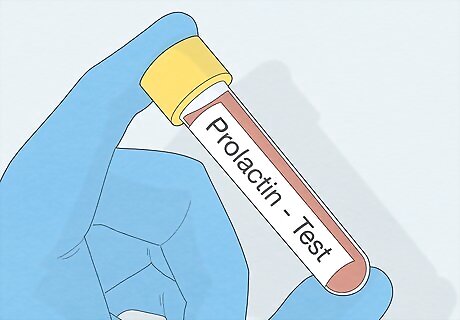
Get a blood test to check your prolactin levels with your doctor. If you think your prolactin levels are too high, your doctor will require a blood test to confirm your condition. Your doctor will likely order a fasting blood test for you, meaning you can't eat during the 8 hours before the test. Based on the results and your other symptoms, they should be able to diagnose the problem. Symptoms of high prolactin levels include: infertility, low sex drive, and breast engorgement. Men will also experience erection problems, while women will have irregular or no periods. For non-pregnant women, normal levels are between 5 and 40 ng/dL (106 to 850 mIU/L) and between 80 and 400 ng/dL (1,700 to 8,500 mIU/L) if you're pregnant. For men, normal is less than 20 ng/dL (425 mIU/L). Your doctor may run other tests to rule out other conditions, or ask you to take an MRI to take a closer look at your pituitary gland.
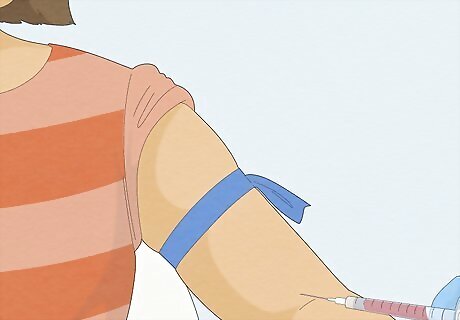
Ask to be tested for hypothyroidism. Hypothyroidism is when your thyroid isn't producing enough of the thyroid hormone. If you have this condition, it can cause your prolactin levels to rise. Your doctor will order a blood test to diagnose this condition. Your prolactin levels will return to normal once you treat the hypothyroidism. In most cases, you’ll take levothyroxine to replace the missing hormones caused by hypothyroidism. Typically, if your doctor notices high prolactin levels, they will check for this condition, but it doesn't hurt to ask.
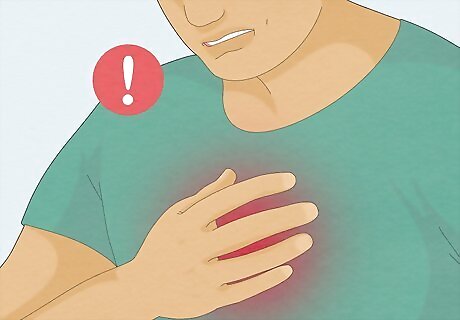
Tell your doctor if you've had a recent chest injury. Chest trauma can temporarily increase your prolactin levels, so tell your doctor if you've experienced any chest injuries in the past few weeks. Hives or shingles on your chest can also cause this symptom. Usually, your prolactin levels will go back down on their own after a chest injury.

Discuss changes in your sexual behavior if you’re male. If you have male gonads, your orgasms actually trigger prolactin spikes. If you’ve experienced any changes in your sexual desires, behaviors, or impulses, it might be contributing to your increased prolactin levels. Open up about your sexual health you’re your healthcare provider.
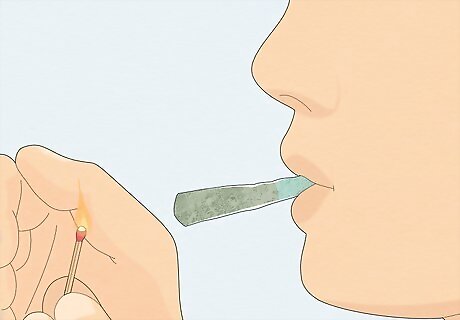
Be honest about any marijuana consumption, if it’s relevant. Marijuana can do funny things to your hormones and if you consume marijuana with any regularity, it may be the source of your increased prolactin levels. Discuss your smoking habits if you regularly use marijuana. Your doctor won’t report you to the police if you smoke and it’s illegal where you live. It’s always best to tell the truth with your healthcare providers!
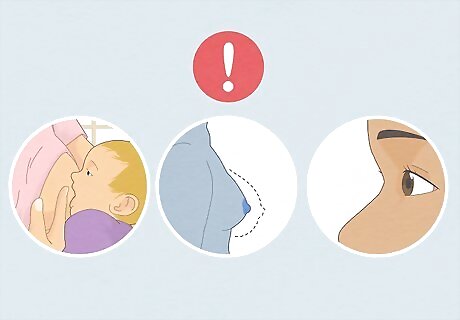
Watch for symptoms of a prolactinoma. A prolactinoma is a type of benign tumor that develops on your pituitary gland. In almost all cases, the tumor is not cancerous (or even dangerous). However, it can cause very high levels of prolactin in the body and make you very uncomfortable, so it’s worth treating most of the time. In women, symptoms of a prolactinoma typically include changes in menstruation, reduced sex drive, and decreased milk production if you're breastfeeding. In men and women who don't menstruate, you may experience a low libido (due to decreased testosterone). You may also experience breast growth. If the tumor is especially large, you may experience headaches or trouble with your vision.


















Comments
0 comment